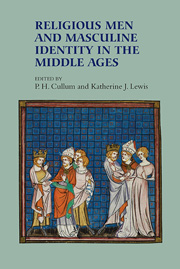Book contents
- Frontmatter
- Contents
- List of illustrations
- Contributors
- Acknowledgements
- Introduction
- From salve to weapon: Torah study, masculinity, and the Babylonian Talmud
- Gender and hierarchy: Archbishop Hincmar of Rheims (845–882) as a religious man
- The defence of clerical marriage: Religious identity and masculinity in the writings of Anglo-Norman clerics
- Writing masculinity and religious identity in Henry of Huntingdon
- ‘The quality of his virtus proved him a perfect man’: Hereward ‘the Wake’ and the representation of lay masculinity
- Episcopal authority and gender in the narratives of the First Crusade
- ‘What man are you?’: Piety and masculinity in the vitae of a Sienese craftsman and a Provençal nobleman
- ‘Imitate, too, this king in virtue, who could have done ill, and did it not’: Lay sanctity and the rewriting of Henry VI's manliness
- John of Bridlington, mitred prior and model of the mixed life
- Why men became monks in late medieval England
- Feasting not fasting: Men's devotion to the Eucharist in the later Middle Ages
- Index
The defence of clerical marriage: Religious identity and masculinity in the writings of Anglo-Norman clerics
Published online by Cambridge University Press: 05 September 2013
- Frontmatter
- Contents
- List of illustrations
- Contributors
- Acknowledgements
- Introduction
- From salve to weapon: Torah study, masculinity, and the Babylonian Talmud
- Gender and hierarchy: Archbishop Hincmar of Rheims (845–882) as a religious man
- The defence of clerical marriage: Religious identity and masculinity in the writings of Anglo-Norman clerics
- Writing masculinity and religious identity in Henry of Huntingdon
- ‘The quality of his virtus proved him a perfect man’: Hereward ‘the Wake’ and the representation of lay masculinity
- Episcopal authority and gender in the narratives of the First Crusade
- ‘What man are you?’: Piety and masculinity in the vitae of a Sienese craftsman and a Provençal nobleman
- ‘Imitate, too, this king in virtue, who could have done ill, and did it not’: Lay sanctity and the rewriting of Henry VI's manliness
- John of Bridlington, mitred prior and model of the mixed life
- Why men became monks in late medieval England
- Feasting not fasting: Men's devotion to the Eucharist in the later Middle Ages
- Index
Summary
A poem of unknown provenance from the late eleventh or early twelfth century shares what must have been the perspective of a married priest at a time of changing laws on clerical marriage. The writer tells us:
We married clergy were born to be made fun of, to be ridiculed, to be criticised by everyone … you draw up harsh laws, bitter statutes, and make things generally impossible for us. You deny it is right to touch a woman's bed and to consummate the marriage rite in the bridal chamber. But it is the natural right of a man to enjoy his wife … this response rightly takes account of the laws of nature: if no one propagated, if no man procreated, everything would come to an end … a half man, an effeminate, you steal the prostitute's joys … you are driven by a lust which all of nature abhors.
This writer, clearly a married cleric, touches upon the prominent beliefs on clerical marriage held by those who defended it as a right. He points to the ridicule, the shame, and the dishonour created by laws banning clerical marriage. He suggests that such laws are new and severe, that such decrees do not consider the real effects on clerical families. He points to the importance of procreative sexuality and its place in the ‘natural order’.
- Type
- Chapter
- Information
- Religious Men and Masculine Identity in the Middle Ages , pp. 46 - 63Publisher: Boydell & BrewerPrint publication year: 2013



